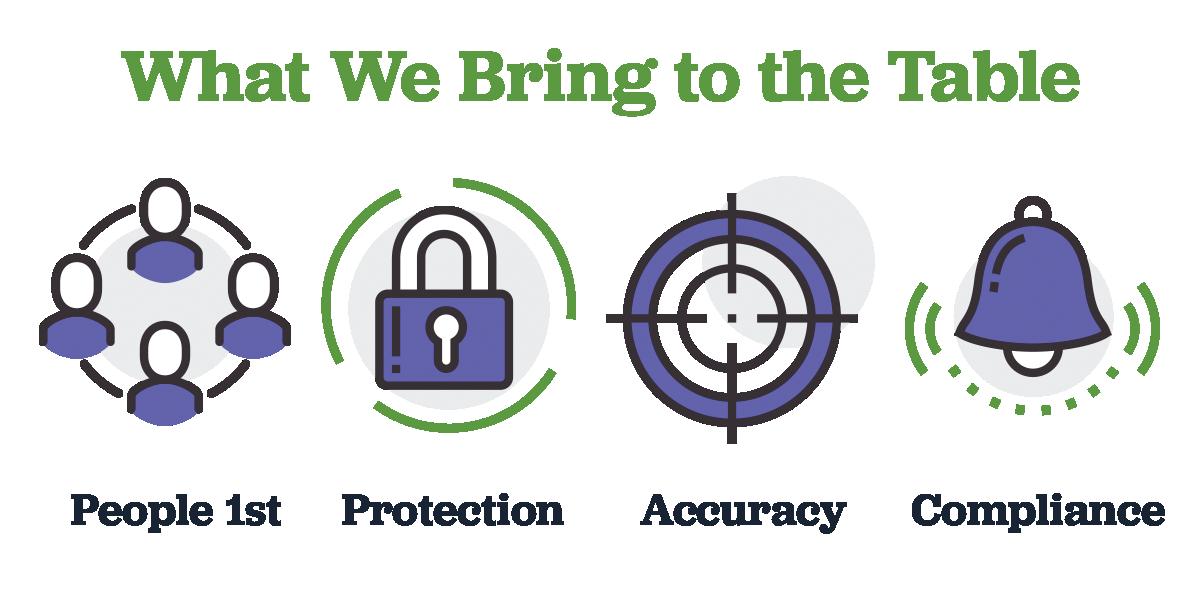
11 minute read
See Something, Say Something, Do Something, That is What Truly Matters: BLACK HISTORY MONTH
By AMY SCHABACKER DUFRANE
February is Black History Month, which is officially recognized by governments in the U.S. and Canada and observed in Ireland and the U.K. It focuses our attention on the contributions of Black people as well as teaches us about noteworthy individuals who have helped shape and change our society. The last few years have been particularly historic, and to help us understand the magnitude of the diversity and inclusion topic, I’ve turned to Dr. Denise Caleb, president of the Human Resource Standards Institute (HRSI), an HRCI company.
Denise, awareness of the Black diaspora has intensified over the past few years. Do you think employers have made strides in reducing discrimination?
That is a loaded question because it depends on the industry and the organization that is being evaluated. And the measure of discrimination itself is a complex question, which can be difficult to evaluate.
If we were to review the measures organizations have put in place that align with the international standards of diversity and inclusion and represent alignment with the HR Standards of ISO 30415:2021 Diversity and Inclusion, measured by The Human Resource Standards Institute (HRSI), we can start to have an objective and consistent way to measure if D&I is increasing, and in turn impacting the reduction of discrimination in the workplace. There are several organizations that had a high commitment to diversity, inclusion, equity, equality, and justice prior to what some would call the perfect storm of civil unrest based on the murder of George Floyd and the COVID-19 pandemic. Many organizations already had a high level of understanding of what it means to build a workforce and workplace committed to DEIB. These organizations demonstrate the impact of their DEIB — showing up in their financials, human capital, and the communities in which they serve. I would commend and have been impressed by organizations, such as McDonald’s Corporation, Delta Dental of Virginia, Adobe, Silk Relo, Nike, Asian Tigers, Graebel Companies, and Microsoft, based on a variety of D&I measurements both before and after the murder of George Floyd, which has now become a pivotal milestone measure towards D&I progress. Each of the mentioned organizations has robust transparent programs, some with multi-year goals and plans striving to impact their markets and build true representation at all levels of their organizations.
I share your admiration for these organizations as well. What about on an individual employee experience level? Can you give us some examples of racial discrimination?
Unfortunately, racial discrimination does exist at work. As HR professionals we play such a critical role in how this is overcome within the work environment. The goal is for workplaces to establish outlets where employees can voice their concerns, experiences, examples, and facts and be taken seriously when they experience discriminatory threats. But what often continues to happen is those who are at the hands and subjects of discrimination are often not believed, are not taken seriously, or must over-explain to justify their concerns or have a recording of the discrimination as proof to be heard and believed. Discrimination shows up in many shapes and forms, often looking and varying from subtle to blatant.
It can look as subtle as:
• Asking Black women if they would consider straightening their hair for the annual photo shoot so everyone has a professional headshot, suggesting the ethnic texture of their hairstyle is not professional.
• Telling a Black woman that she is coming off as aggressive or angry versus allowing the employee to speak with passion and command, thus creating a work environment that is free of stereotyping employees with biases.
To as Blatant as:
• Being asked to speak more “traditional,” meaning the employee needs to sound white versus sounding so ethnic or having such a heavy Black accent, meaning a person needs to sound a little less “blackish.”
• Favoring the promotion of a white male candidate over a Black female candidate to an executivelevel role, based on the opinion that everyone will feel more at ease and safe with a white candidate in power.
Although uncomfortable to read these types of examples in print, the sad truth is that all these examples are real and actual experiences faced by Black employees – and continue to face daily.
What can be done to ensure an inclusive work environment for Black employees?

The complexities of the work environment for Black employees have a long and intricate history. Here are some of the basics for creating inclusivity for Black employees:
• Create psychologically safe work environments where raising concerns of discrimination allows those employees to be heard and taken seriously.
• Create a diverse environment where Black employees can see themselves reflected at all levels of the organization from the board, executive level, director, management and front line.
• Truly recognize that Black employees are living a dissimilar experience than non-black employees and need different support systems in place, especially when in leadership roles.
• Know and understand that the “Glass Cliff” for Black women executives is real. These executives need to be promoted with the appropriate resources and support in place.
• Have zero tolerance for racial discrimination, microaggressions, and known & expressed biases.
• Take time, not only during Black History Month but throughout the year to be an ally versus a bystander.
Denise, as HR and business leaders, what’s our role?

When it comes to creating an inclusive work climate, it is key for leaders to provide platforms and avenues for employees to arrive at work as their authentic selves. And when employees do show up as they were told they could, under the promise that the organization believes in and practices inclusivity, equity, and equality, these employees should not be penalized, demonized, or threatened. Organizations cannot call for and open the door for authenticity and then turn around and weaponize the employee’s true self against the employee.
At the end of the day, we all need to start somewhere to make progress happen and to make an impact. Sometimes it can be overwhelming to think, as an individual, what can I do to best support the Black Community? Often, we need to keep it as simple as being an advocate, meaning if we See Something, Say Something, Do Something!
Thank you, Denise. Progress is being made, but for it to be sustainable, the measurement of D&I needs to be objective. The work you and your team are doing at the HRSI, specifically the D&I Organizational Certification, is a durable foundation for measuring processes, practices, and outcomes.
Amy Schabacker Dufrane, Ed.D., SPHR, CAE, is CEO of HRCI, the world’s premier credentialing and learning organization for the human resources profession. Before joining HRCI, she spent more than 25 years in HR leadership and teaching roles. She is a member of the Economic Club, serves on the Wall Street Journal CEO Council, is a member of the CEO Roundtable, and is on the board for the Columbia Lighthouse for the Blind. Amy holds a doctorate from The George Washington University, an MBA and MA from Marymount University, and a BS from Hood College.
Certificate In Diversity And Inclusion In Hr Management
The three courses comprising our certificate were developed in accordance with the International Organization for Standardization’s guidance on diversity and inclusion for organizations (ISO 30415:2021).
•
Data Facts is the brainchild of current CEO and Founder, Daphne
Large. In 1989, Daphne was climbing the corporate ladder at a large Memphis-based firm. Even in her 20’s, Large was savvy enough to see that a person enjoyed more opportunities when they created their own.
And so, she jumped off the cliff of entrepreneurship and Data Facts was born in July 1989.
Daphne was an early pioneer of diversity and inclusion initiatives before the concept even had a name. Within the first few years, she promoted several high-performing women to positions of leadership. The company thrived on the premise of “we can accomplish anything we set our minds to doing”.
Since those early days, there have been many enormous industry changes and technology advances. Staying competitive demanded that Data Facts make heavy investments in equipment, talent, and training.
Even though the landscape is vastly different now than it was 34 years ago, Data Facts’ overall concept remains steadfast. In Daphne’s words: “If we take care of our people, they will take care of our customers, who will then take care of the company. We do and it works.”
In a world of advanced technologies, Data Facts believes it is still people doing business with and serving people. “So many companies take the people and human aspect out of their business models,” says Large. “At Data Facts, while in pursuit of and utilizing best in class technology, we will never diminish our central focus on people which includes our customers, our team, job candidates, our vendors and partners. People are at the foundation of everything we do.”
Data Facts is 100% women-owned background screening company and employs a fully U.S. based support staff. While operating globally, their geographical base allows them to keep jobs in the United States. In addition, a top priority is placed on compliance, which shows in their accreditation with the PBSA and our SOC 2 Type 2 designation. Their team promises a relationship built on trust, transparency, and consistency.
Why Data Facts Exists
One of the biggest aspects of a company’s success is its people. Hiring the right ones increases an organizations productivity, enriches its culture, and maintains its competitive edge. A key component for a successful hiring process is background screening.
By reviewing an applicant’s background, their criminal record, education, employment, and driving histories, employers gain a more complete understanding of the candidate and their behaviors. This insight empowers better hiring decisions.
Data Facts is a full-service background screening provider, with a rich understanding of numerous industries and the requirements demanded by each one. “Our company helps other companies achieve longrange success and maximize their human capital investment,” says Julie Henderson, Data Facts’ Chief Revenue Officer. “Because of our expertise helping organizations of all sizes across many industries make more informed decisions, we understand the need for accurate and thorough information to be delivered seamlessly.
This ideology is reflected in the company’s Brand Promise, which is “To deliver information your trust. The first time. On time. Every time.”. Every Data Facts employee performs with this promise in mind every day, along with the company’s Core Values:
Actions Speak Louder Than Words. Do the Right Thing.
Be Extraordinary. Not Extra-Ordinary.
Be The Green Umbrella. Stand Out. Stay Relevant.
Cross The Finish Line – Deliver What We Promise and Never Give Up.
Good, Better, Best... Never Let It Rest.
Knowledge Is Power – Share It. Use It.
Data Facts Offers a Unique Perspective
Data Facts is a proven, trusted partner for making sound hiring decisions because they understand the challenge of screening potential employees in an economy starved for labor. To solve this, they leverage technology to amplify our efforts, but also employ real people to provide common sense and exceptional customer service.
The result? Reliable candidate and employee information that’s returned quickly and efficiently. “We help HR leaders, risk management professionals, and other stakeholders across many industries proceed confidently with their new hires,” says Lisa May, the company’s Executive Vice President. “We create confidence that organizations will mitigate risk as they seek to grow staff at a rapid pace or scale. When you work with Data Facts, you’re investing not only in your business but also in an invaluable partnership. We’re pioneers in the industry and passionate about creating safe, secure workplaces.”
Who We Are
From the highest-ranking person in the company to the newest team member, everyone makes a valuable contribution to both company and client success. The diverse background and viewpoints of Data Facts’ people are woven into the rich fabric of their company’s culture.
Ø Maintain a People First Approach
People are at the core of everything we do. Each Data Facts employee embodies our core values daily, and it shows in the work we do and the relationships we build with our clients and each other.
Ø Focus on Protecting Your Workplace
By protecting your company from poor, unsafe hiring decisions, you’re also protecting your employees and those you serve. Safeguard against risky lawsuits by ensuring you make the right choice the first time.
Ø Provide Accuracy
Our quality control process and our intuitive platform helps you land that perfect candidate the first time, on time, every time. We never sacrifice accuracy for speed, leveraging our tools and our certified private investigators to give you the information to help you choose your next hire wisely.
Ø Assist in Compliance Excellence
Data Facts is diligently committed to the highest level of compliant processes and procedures, as their Senior Vice President of Compliance, Johnna Leeds, can attest to. “We provide as many resources as possible for our clients, and tools to help keep HR professionals aware of upcoming changes in laws that affect background screening.”


Ø Enable Seamless Experiences
Businesses want and need a background screening solution that’s quick, easy, and user-friendly for them and their applicants. We consistently watch market trends to ensure that our technology stack and client offerings are at the head of the pack. Data Facts integrates with dozens of Applicant Tracking Software (ATS) solutions, offers rich mobilefriendly processes, and provides an intuitive, seamless, ordering and retrieval report process.
a competitive advantage in the Consumer Reporting Industry and started Data Facts. Headquartered in Memphis, Tennessee, Data Facts initially focused on providing consumer information to mortgage lending institutions to assist them in closing mortgage loans. In 1991, Data Facts diversified its portfolio by expanding into the Background Screening industry.
2003 - Creation of the PBSA
In 2003, Data Facts recognized the need for stricter industry regulations regarding background screening agencies and the information they provide to their clients. Data Facts became one of the founding members of the Professional Background Screening Association (PBSA), then known as the National Association of Professional Background Screeners (NAPBS). Over the next nine years, Data Facts shaped the foundation of the PBSA. Shortly after accreditation was offered, Data Facts became PBSA accredited.
2014-2015 - Certifications & Continued Growth
Data Facts received their SOC 1 and SOC 2, Types I & II certification. Additionally, Daphne Large was inducted into the Society of Entrepreneurs. The company also acquired One Source out of Texas. In 2015, Data Facts received their Women Business Enterprise National Council (WBENC) certification and became officially recognized as a womanowned and operated business.
2018 - Moved Locations
In 2018, Data Facts expanded its operations and relocated to their new corporate headquarters at 8000 Centerview Parkway in Cordova, Tennessee. This relocation tripled Data Facts footprint and consolidated two Memphis locations into one corporate facility.
Two months later, Data Facts was ranked as a top background screening provider by HRO Today’s Baker’s Dozen Customer Satisfaction Ratings.
2019 - Acquisition of Background Decision
Driven by an entrepreneurial spirit, Data Facts doubled in size with the acquisition of Background Decision based out of Holyoke, Massachusetts. This allowed Data Facts to offer a wider range of complimentary and adjacent background screening products and solutions to our customers and increased our influence with legislative and regulatory activities. Later in 2019, Data Facts was ranked again by HRO Today’s Baker’s Dozen Customer Satisfaction Ratings.
2020 - Today – Looking to the Future
As with many companies, Data Facts faced many challenges in 2020, but came through the pandemic successfully and emerged stronger. In 2020 and 2021, Data Facts ranked on the HRO Baker’s Dozen Customer Satisfaction Ratings as an Overall Midsize Program Pre-Employment Screening Leader. In 2022 they were again ranked, this time at the Enterprise Level. Data Facts is moving toward the future focused on maintaining and expanding the full suite of background screening solutions, top-notch client support, and up-to-the-minute technology required by our clients.
Data Facts’ Company History
1989 - Founding and expansion into the Background Screening Industry.
Daphne Large, founding CEO of Data Facts started her career at age 16 working for Equifax Services. In 1989, Daphne recognized










